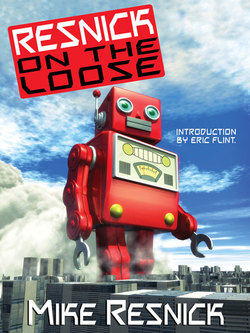Читать книгу Resnick on the Loose - Mike Resnick - Страница 11
На сайте Литреса книга снята с продажи.
ОглавлениеBreeding Like Rabbits—Or Hugos
Walk up to any serious science fiction reader and name the last hundred Hugo winners. Chances are he’ll know less than a quarter of them, no matter how much of the stuff he reads.
There’s a reason for it.
Movies have the Oscars. Theater has the Tonys. Television has the Emmys. Mysteries have the Edgars. And we here in the field of written science fiction have the Hugos.
They’re our most prestigious award. Even overseas, every science fiction writer, reader and fan knows what the Hugo is.
The problem is that it’s not what it used to be. Maybe it never was.
The Hugo was first awarded in 1953. It went to Best Novel, Best Magazine, Best Cover Artist, Best Interior Artist, Excellence in Fact Articles, and Best New Author. Six awards, and only two went to writers (although everything went to professionals, a situation that would change before long.)
Move the calendar ahead to 1957, and only three Hugos were handed out. Right—just three.
1957 was an aberration. By 1963 we were back to giving out six Hugos—Novel, Short Fiction, Artist, Magazine, Drama and Fanzine. No one had a problem with that. We were thrilled that TV and movies were starting to take us seriously, and since fandom was responsible for putting on the Worldcon where the awards were handed out, it made sense that they’d want to award Best Fanzine.
It started innocently enough. But let’s take a quantum leap ahead, to 2007. You know how many Hugos were awarded this year? Fourteen.
And of those fourteen, you know how many were given out for written science fiction, which is the basis for this entire field? Four. That’s right. Less than 30% of the Hugos now go to written works of science fiction.
How did this come about?
Well, 1967 was a very fannish Worldcon. More panels were devoted to fandom, as opposed to written science fiction, than ever before. And since there was nothing in the rules that said you could only give out six Hugos, NyCon III (the 1967 Worldcon, the last to be held in New York), added Best Fan Writer and Best Fan Artist to the list. So, when you include Best Fanzine, NyCon III handed out as many Hugos to fans as to works of science fiction.
By the time of Noreascon II (the 1980 Worldcon, held in Boston), the academics had discovered us, and we them, and a new category was added: Best Non-Fiction Book—and suddenly we had seven annual Hugos that did not go to works of science fiction.
Now, all during the late 1970s and early 1980s, fanzine editors and publishers were grousing about the fact that Locus kept winning Best Fanzine every year. Which figured. It was professionally printed (almost no other fanzine was), it was supported by dozens of ads from major publishing houses (almost no other fanzines had any ads at all), and it had a circulation that was well over 6,000 and climbing (most fanzines printed and distributed less than 300 copies). Clearly there was no way a “traditional” fanzine would ever win the Best Fanzine Hugo again—but aha! The 1984 Worldcon committee came up with a brand-new category—Best Semiprozine—where Locus could win every year to its heart’s content and traditional fanzines could once more win the Best Fanzine Hugo.
And suddenly there were four Hugos for fans and four for written science fiction. In fact, the overall tally by the time of LACon II (the 1984 Worldcon, held in Anaheim) was four fiction Hugos and eight everything-else Hugos.
And so it remained until Buffy came along on the boob tube, and Buffy fans bemoaned the fact that a short TV show couldn’t compete with a $130 million movie. So Torcon 3 created a second Dramatic category for the 2003 Toronto Worldcon: Best Short Dramatic Presentation. It was informally called the Buffy Award, just as the Semiprozine Hugo was informally known for years as the Locus award, the delicious irony being that although Locus has indeed won something like 20 Best Semiprozine Hugos, Buffy never did win the Buffy Award.
As you can see, it’s become a bit of demonstrable folk wisdom that if you lose enough Hugos, sooner or later you can put together enough disenfranchised (read: Hugo-losing) friends so that you can get a new Hugo category installed and maybe have a chance to win one. (The fan awards were not proposed by professional writers, and the short dramatic award was not proposed by people who only watched or produced full-length movies.) This year’s Japanese Worldcon marked the first time that Best Editor was divided into Best Magazine Editor and Best Book Editor. Some of the book editors were getting tired of losing to magazine editors every year (only two book editors ever beat the magazine editors in open competition, and both of them did it posthumously), so one of the book editors, through a fannish surrogate, proposed splitting the award—and to make sure the new one went to a true-blue novel editor, anthology editors were lumped in with magazine editors.
What’s next? I don’t know.
But I know this. We now give out fourteen Hugos every year, and only four go to the reason for the existence of the field, the Worldcon, and the Hugo itself—written science fiction.
Think about it.
